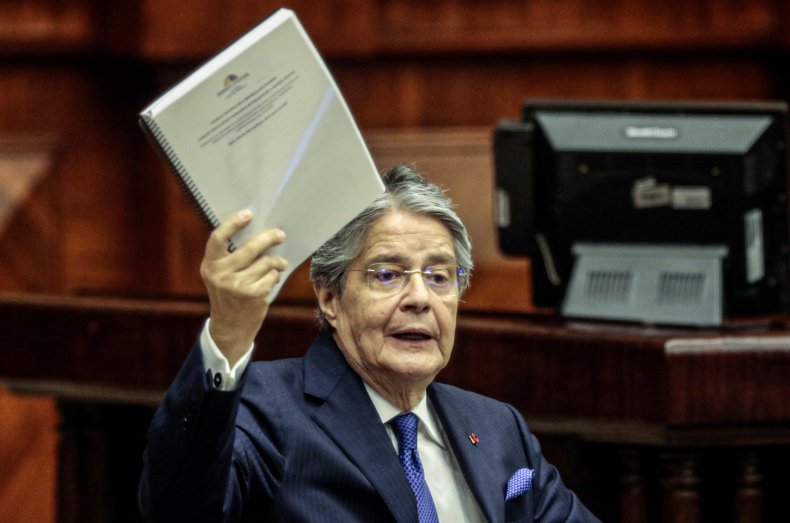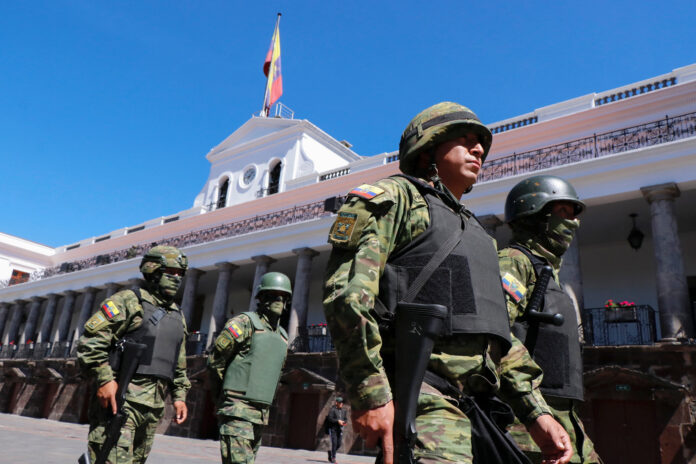President Guillermo Lasso of Ecuador on Wednesday dissolved the country’s National Assembly as the opposition-led body was seeking to impeach him on embezzlement charges.
The conservative leader invoked a constitutional clause known as muerte cruzada (“mutual death”) to disband the assembly, which will lead to snap presidential and legislative elections.
Lasso, who has served as president since 2021, is accused of interfering in contract negotiations between a state-run shipping company and an oil tanker company. The National Assembly’s oversight committee had conducted a report that did not recommend impeachment for Lasso or his removal, but lawmakers voted on May 9 to continue the impeachment process.
Lasso has denied the allegations, calling them politically motivated.
Galo Paguay/AFP/Getty
In a tweet announcing that he had invoked the mutual death decree, Lasso said it was “the best decision to give a constitutional solution to the political crisis and internal commotion that Ecuador is enduring and return to the Ecuadorian people the power to decide their future in the next elections.”
The president has received much criticism in response. Among those who condemned Lasso’s actions was Marcela Aguiñaga, the president of the left-wing Citizen Revolution Movement, a political party.
“The #MuerteCruzada was the easy way out that @LassoGuillermo took to evade his political responsibility,” Aguiñaga wrote on Twitter. “We are not afraid of democracy, the seats of the Citizen Revolution belong to the people. It’s time for a change in Ecuador!”
Meanwhile, Ecuador’s National Police stationed officers outside the National Assembly’s building in anticipation of possible protests as a result of Lasso’s actions.

Felipe Stanley/Agencia Press South/Getty
Ecuador’s military has pledged to honor Lasso’s decision, with Nelson Proaño, commander of Ecuador’s armed forces, saying in a video statement that his forces “will uphold their absolute respect for the constitution and law.”
Proaño also said that if any potential protests become violent, the armed forces and police “will act firmly.”
One group that has been responsible for large protests in recent years, the Confederation of Indigenous Nationalities of Ecuador, has already expressed anger at Lasso.
The organization’s president, Leonidas Iza Salazar, wrote on Twitter that Lasso had “launched a cowardly self-coup with the help of the police and the armed forces, without citizen support.”
“This is not the first time a leader has resorted to this Hail Mary tactic, neither in the region nor in the wider world,” said Richard Albert, a law professor at the University of Texas at Austin who once held a visiting professorship at the Universidad de Especialidades Espíritu Santo in Ecuador.
Albert told Newsweek: “Sometimes it works, and sometimes it fails. Two factors suggest it may work in President Lasso’s case: The Constitution authorizes him to dissolve parliament in moments of political crisis and the head of the military has recognized that Lasso possesses this power.”
Lasso can run in the upcoming presidential election, which the country’s National Electoral Council has seven days to schedule and which must be held within 90 days. Candidates who win in the legislative election will complete the terms of the National Assembly member that Lasso took out of office.


